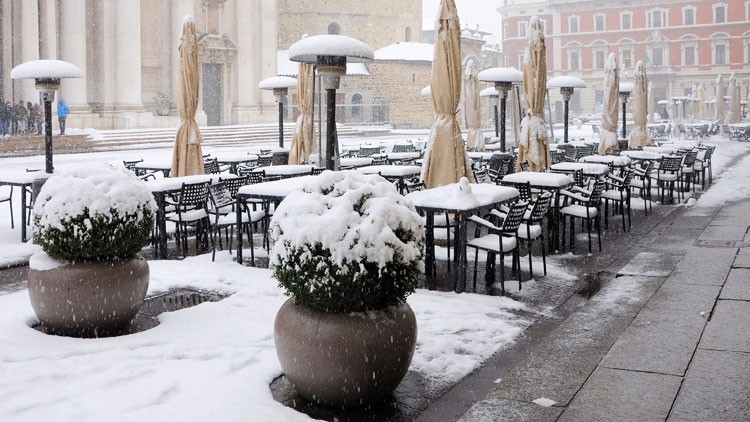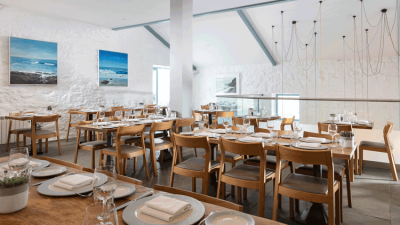The Lowdown: hospitality’s winter of discontent

Things sound pretty desperate…
They are. Speak to chefs and restaurateurs at the moment, and most of them will say that things are worse now than they’ve ever been. And given the struggles faced by the sector during the pandemic, that really is saying something.
What’s causing the biggest headwinds at the moment?
There are plenty of issues to tackle, but in the broadest terms it’s inflation and the rising cost of business that’s pummelling businesses the hardest. Food and drink price inflation in hospitality has risen to 15%, according to the most recent CGA Prestige Foodservice Price Index, which has been attributed to droughts, the war in Ukraine, and soaring costs of commodities, energy and labour throughout the supply chain. Labour costs within the industry are rising too, with staff shortages and the cost-of-living crisis combining to push up wages. And then there’s the spiralling energy costs, which are having a direct impact on operators too with many seeing their bills rocket by unaffordable proportions. One restaurateur looking for a new electric utilities contract for one of his businesses reached out to BigHospitality after discovering he could be facing an annual bill rise of 600%.
That’s terrifying. Is there no support to help businesses cope with all this?
The previous Government announced plans to provide a six-month discount on wholesale gas and electricity prices for all non-domestic customers, which the new Government, under the lead of Rishi Sunak, has vowed to keep. It sees wholesale prices fixed for all non-domestic customers at a rate of £211 per MWh for electricity and £75 per MWh for gas until 31 March 2023. Beyond that, though, there’s nothing.
How are operators managing to absorb these costs then?
Many are simply concluding that they’re unable to. In the last month we’ve heard from multiple businesses across the UK that have been forced to close sites due to spiralling costs. Premium fried chicken brand The Bok Shop has permanently shut its restaurants in Southampton and Eastbourne, with founders Jamie O’Mara and Howard Kaye citing ‘insane’ energy price increases as contributing to the decision. Last week, Oxfordshire restaurant Crockers Henley closed its doors with owner Luke Garnsworthy blaming the 'bleak economic outlook’; while in Bristol, Larkin Cen's Woky Ko group permanently closed its restaurants on Queens Road and at the city's Cargo development due to ‘rising price pressures’. And this week, Will Devlin closed his modern-British restaurant The Curlew in Bodiam, East Sussex, as a result of 'difficult trading conditions', with the chef noting that ‘small businesses are struggling everywhere’.
Sounds like a bloodbath. What are other businesses doing?
Some have chosen to mothball their restaurants through the winter, in the hope that things may be better come the spring. They include chef Michael Caines, whose waterside restaurant and bar The Harbourside Refuge in Porthleven, Cornwall, is to remain closed through the winter and ‘for the foreseeable future’ in a bid to weather the economic storm. Si Toft, chef owner at The Dining Room in Abersotch in Wales, is taking a similar approach and slashing its opening schedule. He recently posted on Facebook saying: “We’ve always struggled to justify the cost of opening over the winter and with spiralling food costs and ridiculous electricity bills we’ve had to be ruthless this year.” Others are trying to drum up support in the build up to Christmas, like Nigerian restaurant Chuku’s in London's Tottenham, which has just launched a campaign to take 100 bookings a week for the next six weeks, in a bid to get the restaurant on a firmer footing financially and, hopefully, avoid closure.
Are things likely to improve going into next year?
Who’s to say, but things certainly don’t look good. New research from CGA by NielsenIQ and Fourth found that the economic uncertainty has significantly damaged confidence in the hospitality sector, with the majority of businesses taking a pessimistic view of the prospects for the eating and drinking out market in the next 12 months. According to the figures, just 8% of leaders of multi-site businesses feel confident about the sector over the next year, a sharp drop from 23% in the last survey in June. Speaking at BigHospitality’s Generation Next event last month, property consultancy Distrkt said it was expecting a rise in liquidations in London in the first half of next year. Staffing levels are also going to continue to be a problem, with chef Jason Atherton warning he may have to mothball a number of his London restaurants in the new year if the current hospitality recruitment crisis does not abate.
Can something be done about it?
Actually, yes. You can make your voice heard at the forthcoming HospoDemo protest, which is set to take place on in November in central London. The demonstration, which is support by high-profile chefs including Yotam Ottolenghi, Jason Atherton and Tom Kerridge, will urge the Government to make policy changes to prevent catastrophic closures within the sector. They include introducing a VAT reduction to 10% on food and drink sales; reinstating the business rates holiday; and bringing in a visa scheme to allow overseas workers to work in the sector again.
I like the sound of that. How do I get involved?
All you need to do is turn up at Parliament Square on the morning of 14 November dressed in your work uniform and equipped with pots, pans, ladles, cocktail shakers, wooden spoons, last orders bells and other hospitality-related tools with which to make yourself heard. At 11am, all protestors will turn to face the Houses of Parliament and make as much noise as possible to ensure the sound resonates within the building, before marching on to HM Treasury to do the same. Let’s just hope the Government’s listening.





















